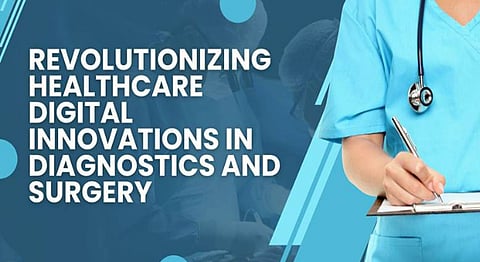

By integrating artificial intelligence, real-time analytics, and robotic-assisted procedures, digital health platforms are reshaping modern medicine. This transformation is led by experts like Jaswanth Kumar Vuggumudi, whose work explores how these technologies enhance precision, efficiency, and accessibility in healthcare.
Artificial intelligence (AI) has significantly improved diagnostic accuracy by leveraging machine learning algorithms to process vast amounts of medical data. These systems achieve high concordance rates with specialist diagnoses, particularly in fields like radiology and pathology. The use of convolutional neural networks (CNNs) has led to remarkable advancements in disease detection, with accuracy rates exceeding 90% in early-stage identification. By minimizing diagnostic errors, AI-driven platforms enhance patient outcomes and reduce healthcare costs.
Robotic-assisted surgery is revolutionizing healthcare by improving precision and reducing recovery times. These systems incorporate real-time analytics, motion control mechanisms, and haptic feedback to refine surgical procedures. The ability to calibrate within millimeter precision has reduced post-operative complications and enhanced procedural efficiency. Additionally, robotic platforms enable minimally invasive techniques, leading to faster patient recovery and fewer surgical risks.
The integration of robotic surgery with AI-based preoperative planning further enhances accuracy by allowing surgeons to simulate procedures before operating. This capability significantly reduces surgical errors and improves patient safety. With the adoption of robotic platforms growing worldwide, more hospitals are incorporating these technologies to standardize surgical excellence and improve patient outcomes.
Cloud-based healthcare platforms provide robust data management and interoperability, ensuring seamless integration across various medical departments. Real-time analytics enhance clinical decision-making by processing patient data instantaneously, leading to optimized resource allocation and reduced operational costs. These systems have also demonstrated success in remote and underserved areas, expanding access to quality healthcare.
With cloud computing, healthcare providers can securely store and analyze patient information without concerns about data loss. AI-driven analytics improve workflow efficiency by identifying trends in patient health, assisting in early disease detection, and allowing for predictive healthcare strategies. This ensures that hospitals can proactively manage resources, reducing wait times and improving patient experiences.
The integration of augmented reality (AR) in surgical care has enhanced visualization and procedural accuracy. AR overlays real-time data on the surgical field, improving spatial awareness and aiding in complex operations. The precision of AR-driven systems, combined with AI analytics, allows for improved surgical planning and execution. These innovations have decreased surgical planning time and improved patient recovery rates.
AR technology also provides surgeons with a three-dimensional perspective of anatomical structures, offering an unprecedented level of detail. By superimposing digital images onto real-world views, AR helps guide surgical instruments with extreme accuracy. This innovation has been particularly valuable in neurosurgery and orthopedic procedures, where precision is critical.
Advancements in genomic sequencing have transformed disease detection and treatment planning. Digital health platforms process vast genomic datasets with high accuracy, enabling personalized medical approaches. By integrating phenotype-genotype correlation engines, these systems enhance diagnostic precision and facilitate targeted therapies, reducing adverse drug reactions and improving treatment effectiveness.
The ability to map genetic information with AI-driven insights has accelerated the development of precision medicine, tailoring treatments to individual patients rather than adopting a one-size-fits-all approach. Pharmacogenomic analysis further ensures that medications are prescribed based on a patient’s genetic profile, minimizing side effects and improving therapeutic outcomes.
As digital healthcare expands, ensuring data security and regulatory compliance remains paramount. Encrypted storage, multi-factor authentication, and automated compliance tracking have significantly reduced data breaches and unauthorized access incidents. These measures safeguard patient confidentiality while maintaining adherence to global healthcare regulations.
Healthcare organizations are investing in cybersecurity frameworks that integrate AI-driven threat detection, ensuring real-time identification of potential security breaches. By strengthening encryption protocols and access controls, digital platforms continue to enhance patient trust while complying with stringent legal standards.
In conclusion, the continuous evolution of AI, cloud computing, and robotics is driving the next wave of medical innovations. These advancements will further improve patient care, streamline hospital operations, and expand healthcare accessibility worldwide. Digital health platforms are setting a new benchmark in medical excellence, ensuring a future where technology and healthcare work seamlessly together. As the industry continues to evolve, professionals like Jaswanth Kumar Vuggumudi remain at the forefront, shaping the next generation of healthcare innovations. Their contributions are instrumental in bridging the gap between cutting-edge technology and practical medical applications, paving the way for a more efficient, accurate, and patient-centered healthcare system.
